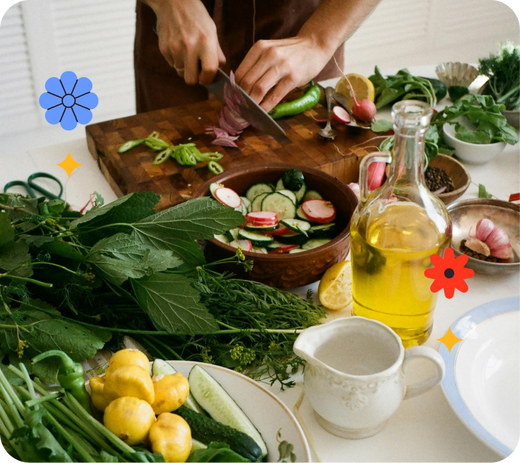Muscle-building diets commonly involve loads of grilled chicken breasts, eggs, whey protein powders, and other animal-based products. So, can you really build muscle if you skip all these and focus only on plant-based foods?
The calorie deficit required for weight loss can be achieved on a plant-based diet. But how can you build muscle if you are in a calorie deficit? Traditionally, bulking up involves increasing your calorie intake.
So, is it really possible to lose fat and build muscle at the same time - and that too on a plant-based diet? These are valid concerns, especially for vegan bodybuilders.
Let’s explore how you can simultaneously lose fat and build muscle on a plant-based diet. Follow our nutrition tips to create the best diet to gain muscle and lose fat while maintaining a vegan lifestyle. Incorporating the right combination of plant-based foods into your diet can help achieve your fitness goals.
Key Takeways:
- You can lose fat and build muscle at the same time with a high-protein vegan diet, calorie management, and cardio/resistance training.
- Plant-based diets support muscle building and fat loss since they offer quality protein sources and foods that are low in calories but rich in nutrients.
- To achieve these fitness goals, vegans need to have a high-protein diet with balanced macros, take micronutrient supplements as needed, manage their calorie intake, practice portion control, and ensure proper hydration.
Can you Lose Fat and Build Muscle at the Same Time?


It is indeed possible to shed unwanted body fat and gain muscle at the same time. This is commonly referred to as "body recomposition”. But it’s not that easy. This requires discipline, consistency, and a balance of several factors such as:
High protein diet: Protein is vital for muscle repair and growth. Both muscle gain and fat loss benefit from a high-protein diet. Protein boosts metabolism, increases satiety, keeps you full for longer, and helps overcome food cravings. All these assist with fat loss. You can even have a protein shake as a nighttime snack to improve your sleep and speed up muscle recovery.
Calorie intake: While there has to be sufficient calorie intake to build muscle, you also need a calorie deficit to lose unwanted fat. The key here is to eat enough of the right foods to provide the energy and nutrients needed for muscle growth. Achieving this balance can be tricky, but it can be done.
Cardio and Resistance Training: Cardio exercises increase calorie expenditure and aid in fat loss. However, it is crucial to add resistance training to your workout routine to build muscle. Weightlifting and bodyweight exercises both stimulate muscle growth. Thus a combination of resistance and cardio training is recommended for body recomposition.
Experience Level: When it comes to body recomposition, beginners tend to have an advantage over experienced athletes, in losing more fat and gaining muscle.
Genetics: Genetics plays a significant role in how your body responds to diet and exercise. Some people find it easier to gain muscle and lose fat while others struggle to do so. Some need to lose weight first and then focus on muscle building or vice versa.
Is a Plant-Based Diet Really Effective?
There are many bodybuilders who rely on plant-based diets to fuel their workouts and achieve their fitness goals. Plant-based diets offer numerous health benefits such as:
- Nutrient-density: The effectiveness of a plant-based diet lies in its focus on nutrient-dense foods including fruits, vegetables, legumes, and whole grains. The high intake of such foods provides essential vitamins, minerals, and antioxidants that support muscle building and boost your overall health.
- Lower caloric density: Vegan diets tend to be lower in caloric density. This helps reduce your overall calorie intake and promotes weight loss.
- Balanced macronutrients: A vegan diet can provide the optimum balance of the necessary macronutrients, such as carbohydrates, proteins, and fats, to fuel your workouts and support muscle development.
- Quality protein sources: Protein is crucial for muscle repair and growth. You can high-quality protein sources like legumes, tofu, tempeh, and seitan on a plant-based diet.
- Improves digestive health: A vegan diet has high fiber content which promotes healthy digestion.
- Reduces inflammation: Plant-based diets may help reduce chronic inflammation, which in turn, leads to better recovery and muscle growth.
- Improves Blood Sugar Control: Plant-based diets can help improve your blood sugar control. This helps with weight management. It is also beneficial for those with diabetes.
- Lowers blood pressure: Having plenty of potassium-rich fruits and vegetables helps lower blood pressure and reduces the risk of hypertension.
- Low in Saturated Fat: Vegan diets have less saturated fat compared to diets with animal products. This contributes to healthier blood cholesterol levels and reduces the risk of heart disease.
6 Nutrition Tips to Follow
Check out these nutritional tips to effectively lose fat and build muscle on a plant-based high-protein diet:
- Eat adequate protein: To lose fat and gain muscle, you must ensure you are getting enough protein from high-quality plant-based sources such as tofu, tempeh, legumes, and quinoa.
- Keep your macros balanced: Don't forget to add complex carbs and healthy fats to fuel your workouts and aid recovery.
- Supplement with micronutrients: Vitamins and minerals, especially B12, iron, and calcium are important in a muscle-building diet. Add supplements, if needed.
- Adjust your calorie intake: You should adjust your calorie intake according to your fitness goals. A calorie deficit is necessary for fat loss while you may need a calorie surplus to gain muscle.
- Practice portion control: Managing your portion sizes helps create the caloric surplus or deficit needed for muscle gain or weight loss. Eat more on the days you work out and eat less on the days you don’t.
- Keep yourself hydrated: Drink plenty of liquids, especially water. Proper hydration is important for overall muscle function and health.
Best Vegan Food Options


Including these vegan foods into your diet can help you gain muscle and lose fat:
- Fruits and Vegetables: These form the foundation of a vegan diet, providing essential nutrients, vitamins, and minerals. You can have plenty of berries, leafy greens, avocados, and sweet potatoes.
- Legumes: These are the best sources of plant-based protein. You can use various legumes such as beans, lentils, chickpeas, and peas.
- Whole Grains: Opt for fiber-rich whole grains such as brown rice, quinoa, and oats. These keep you feeling full for longer and offer sustained energy.
- Nuts and Seeds: Include plenty of nuts in your diet for healthy fats, protein, vitamins, and minerals. This includes almonds, walnuts, cashews, pista, etc. You should also add seeds such as chia, flax, and sunflower seeds to your diet.
- Soy-based products: Tofu and Tempeh are rich in protein. You can use them in numerous recipes from stir-fries to sandwiches.
- Plant-based milk: You can extract the milk from almond, soy, oat, and coconut milk. Use them in smoothies, cooking, and baking. You can also use plant-based milk to make vegan or dairy-free yogurt.
- Nutritional yeast: Rich in B vitamins, nutritional yeast has a cheesy flavor. Sprinkle them on vegan snacks, and salads or use them in smoothies.
- Seaweed: Nori and other seaweeds can be used for making sushi rolls, soup, etc.
- Plant-based oils: You can use olive oil, coconut oil, or avocado oil for cooking and salad dressings.
- Herbs, spices, and condiments: You can enhance the flavor of your dishes with a variety of herbs and spices. You can also use vegan condiments such as mustard, ketchup, and hot sauce. Experiment and add exciting new flavors to your meals with vegan dips and dressings using salsa, hummus, guacamole, and tahini.


Plant-Based Diet Plan to Gain Muscle and Lose Fat


Here's a sample plant-based diet plan that can help you gain muscle and lose fat.
Breakfast: A glass of protein smoothie made using pea protein powder, almond milk, spinach, banana, and chia seeds. (300 calories, 25g protein)
Mid-morning snack: ½ cup of mixed nuts (200 calories, 20g protein)
Lunch: Quinoa and chickpea and salad with mixed vegetables and a tahini dressing (400 calories, 20g protein)
Evening snack: 1 cup of Greek-style yogurt made with almond milk (150 calories, 15g protein)
Dinner: Tofu stir-fry with broccoli, bell peppers, and peanut sauce. Serve with brown rice. (450 calories, 25g protein)
Dessert: 1/2 cup of chia pudding made with almond milk and chia seeds (200 calories, 5g protein)
This vegan diet plan has about 1700 calories and offers you 110 grams of protein. However, this can vary based on the quantity and quality of ingredients you use. You should adjust your food choices and portion sizes to meet your specific calorie and protein goals.
Conclusion 

To sum up, you can indeed lose weight and gain muscle with a plant-based diet. For a healthy and effective approach, you need to pay attention to your caloric intake with a focus on having nutrient-dense foods and the right balance of macronutrients. Check out the vegan food options and the sample plant-based menu we have provided to help you get started on your fitness journey.

































